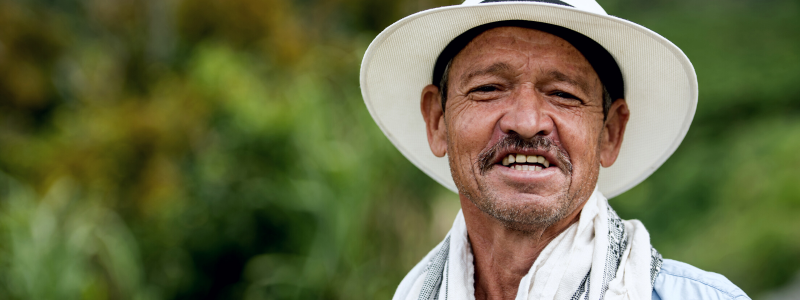How to talk in spanish like a Colombian?

Now that you are learning Spanish in Medellín, have you heard some expressions that you do not understand, or maybe you have felt that you don’t sound like your native friends? This is a common problem when we are learning other languages. If your concern is that you don’t know how to talk in Spanish Like a Colombian, here are some expressions that you can use to understand and sound more natural when talking to your friends in Colombia while studying Spanish.
Read the next expressions and learn how to talk in Spanish like a Colombian:

- Parce o Parcero: This is probably one of the most popular expressions in Colombia. It is widely used in Medellín, but it can also be heard in other parts of the country. We use this word to refer to a friend, so while you are studying Spanish and talking to some of your classmates you can tell them: Ustedes son mis parceros.
- Querido/Querida: When you want to say that someone is a good person in class you will learn words like amable, agradable or noble. Still, when you are talking to local people while practicing your Spanish you will probably hear the word querido or querida. This is a less formal and more common way of saying that a person is a good person or nice. So, if you want to sound like a real Colombian use this word. For example: mi amiga Ana es tan querida.
- Mor: This expression has become very popular among the youth of the city of Medellin. It is a short form of the word amor and is usually used to talk to your friends or your partner, for example: ¡Oye mor!
- Mijo/Mija: This is an expression you may hear if for some reason while studying Spanish you have contact with older native speakers. It is common to hear them use it to refer to younger people. For example: Oiga, mijo ¿qué necesita?
- Cuchibarbie: Do you know those people who despite their age try to use words of the new generations, dress in modern clothes, and even try to look younger than they are? Well, for those people we have a special word when it comes to women in Colombia, we say Ella es una cuchibarbie.
- Bizcocho: You probably learned that this word is synonymous with cake, but when we use it in Colombia to refer to a person, it means that he or she is beautiful. So now you know when you are a Spanish student in Colombia, and you see a good-looking girl or boy you can say: Es un bizcocho.
Colombian expressions related to the party:

- Echar los perros: Surely if you see these phrases, you will not understand what it means, but here we help you to decipher them while you learn with us. This is a popular phrase in Colombia meaning you would like a person to notice you like him/her a lot, either with nice words, compliments, or gifts. Then you can hear it as for example Bart le está echando los perros Jessica.
- Estar prendido/a: When you go out clubbing with your friends you may hear this phrase: Nell está prendida, and you are probably thinking: What does it mean? Well, it means that she has drunk enough alcohol to be a little dizzy but not enough to be drunk. She is tipsy.
- Tener guayabo: After a party with your friends with lots of drinks, schnapps, dancing, and many other crazy things, you may get a hangover. This is a way to call hangover in Colombia, so if you want to speak like a Colombian while studying Spanish in Medellín you should use: Uy, parce, tengo un guayabo.
- ¿Me regala..?: When you go to a store and want to buy something basically you would say: me vende por favor una cerveza. But if you want to sound more natural and Colombian you should say: Me regala por favor una cerveza, the expression is very common when we go to the store or at a coffee shop.
Colombian expressions related to health:

- Me aporrié: When you hit yourself against a table or chair, or even when you have an accident on your motorcycle or car and you want to tell your friends you would normally say something like: Ah, tuve un accidente y me golpeé muy fuerte la pierna. However, this is not very common to hear in the street. We recommend you say: Ah, tuve un accidente y me aporrié la pierna. This expression is more common and you will sound more natural when you speak Spanish.
- Darle un patatús, soponcio o yeyo: Colombians suffer from different diseases unknown to the rest of the world, this is one of the most common. When you hear that someone le dio un soponcio, le dio un yeyo, or le dio un patatús, it is usually a fainting spell or sudden illness.
- Tener maluquera: We usually use this expression when we feel generally unwell, have a feeling of dizziness, or a headache, or are simply not in the best of health.
- Tener un chichón: Perhaps while studying Spanish in Medellín, you may hear the expression tengo un chichón and you have probably already learned the verb tener, but the word chichón is new and you do not know what it means. Well, here we help you to speak Colombian Spanish, the word chichón refers to a bump that commonly comes out when you hit your head very hard.
Some other useful Colombian expressions:

- Buenas: When you arrive at a place and want to say hello you can use expressions like Buenos días, Hola, Buenos días, or Buenas tardes, but it is very common for Colombians to use the expression “Buenas“. It sounds more natural and you can use it at any time of the day, but be careful, we usually utter it to talk to people you don’t know very well, like a salesperson in a store or a person selling empanadas on the street.
- Qué pena: When you are walking in the street, and you bump into someone you can use expressions like disculpe, but this expression is so formal that for Colombians it sounds very strange. Instead, you can use the expression ¡qué pena! This is more common, and you can use it in the street, on public transportation, and even with your friends.
- Drogueria: When you need to buy some medicine for yourself or a friend, the formal word for this place is Farmacia, but it is more common to use the word Droguería in Colombia, so when you study Spanish in Colombia and need some medicine use the word Droguería to sound like a native.
- Páreme bolas or póngame cuidado: Normally when you take Spanish classes and your teacher wants you to pay attention to something he will say: ¡oye, pon atención! However, this phrase is very formal and, although it is not bad, it is not common to use it with your friends or in the street. Instead, you can use: ¡páreme bolas! or ¡póngame cuidado!, both phrases are more common and less formal, so you can use them with your friends while you practice and study Spanish in Colombia.
- Tinto or tintico: One of the most famous things about Colombia is our delicious coffee, normally when you learn Spanish they will tell you to use the word café, but if you want to sound like an actual Colombian you should change it to tinto or tintico. These words are very common when we talk to the natives and it means you want an American coffee, ¿me da un tintico, por favor? or ¿me das un tinto, por favor?
- Pola: When you want to invite a friend for a beer you would normally say: ¿Vamos por una cerveza?, but if you want to sound more Colombian and less formal you should say: Vamos por una pola. This expression is more informal and common, and your friend will surely say: ¡De una!
- De una or hágale: When you want to accept an invitation from a friend to have a beer or a coffee, certainly as a student you would use the expression: Claro, me gustaría mucho or Sí, por supuesto, but these two phrases are very formal and it is not common to use them with your friends, instead of these you can use De una or Hágale, both are very common and informal and will make you sound like a great connoisseur of the language.
- Me sacó la piedra: When you want to tell your friend that you were arguing with your boyfriend or girlfriend and you want to tell him/her that she or he made you angry would normally say me hizo enojar or me hizo enfadar. But if you want to sound more Colombian you should say: me sacó la piedra, this expression is very common in Colombian slang.
- Eso es chiviado: When you want to say that something is fake or of low quality, such as a T-shirt, shoes, or even makeup, we say: Eso es chiviado.
- Me quedé gringo/gringa: This is an expression we commonly use when we don’t understand a situation or a friend’s story. For example, your friend was talking to you about a subject you don’t understand at all, so you can say: No, la verdad, me quedé gringo.
This would help you too: Speak Spanish as a native: useful slang for your trip in Colombia!
We invite you to use these expressions while you learn Spanish in Medellín. They will help you locally communicate with Colombians.
If you are thinking about learning Spanish Medellín and you are worried about how to talk in Spanish like a Colombian, the time has come! Don’t think twice and let us guide you in your learning process. Remember that you will be hand in hand with the best professionals who will make your experience in the city something you will never forget, contact us now!
Through the WhatsApp +57 312 8698268 or our e-mail info@colombiaspanish.com




